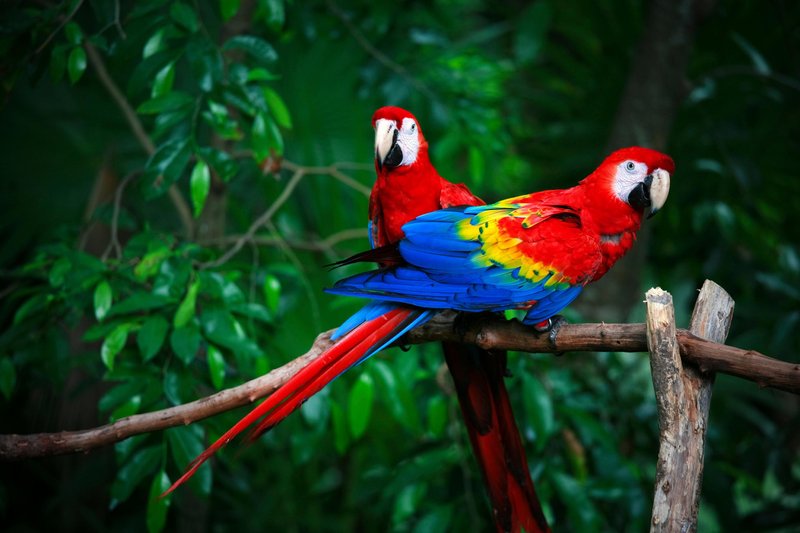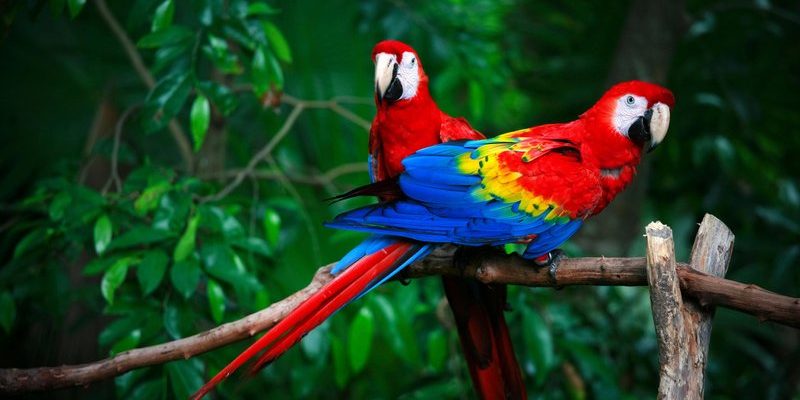
These clever birds belong to the order Psittaciformes, which includes around 393 species. They are known for their strong, curved bills and zygodactyl feet—two toes pointing forward and two backward. But beyond their physical characteristics, parrots have rich social behaviors and complex emotional lives that can surprise you. Let’s explore some lesser-known facts about parrots, and I promise you’ll walk away with a new appreciation for these amazing birds.
1. Parrots Can Live a Long Time
You might be surprised to learn that some parrot species can live for over 50 years! While you may think of dogs and cats as long-lived pets, parrots can outlive many of them. For instance, a well-cared-for African Grey Parrot can easily reach 50 years, and some, like the Macaw, can even live to be 80 years old or more. Imagine having a companion that could be there for decades—through life’s ups and downs.
Their long lifespan means that adopting a parrot is a serious commitment. It’s essential to understand their needs, from proper diet to mental stimulation. You might be wondering how to keep them happy and healthy for so many years. Regular socialization, a balanced diet, and plenty of engaging toys can help ensure a happy, healthy parrot.
2. They’re Social Creatures
Parrots are incredibly social animals, often living in flocks in the wild. Picture a lively gathering of colorful birds squawking and playing together—it’s a sight to behold! In their natural habitats, they rely on each other for companionship, safety, and even foraging for food. You might find it interesting that parrots communicate with a range of vocalizations, not just their famous mimicry.
When they’re kept as pets, parrots can develop strong bonds with their human companions. They often crave social interaction and can become lonely if left alone for long periods. If you’re considering getting a parrot, think about how much time you can dedicate to interacting with them. Consider having more than one parrot if you’re away frequently. They thrive in pairs and keep each other entertained!
3. Parrots Are Incredible Mimics
Here’s the thing: parrots are famous for their ability to mimic human speech, but they’re not limited to just that. They can imitate a variety of sounds, from ringing phones to barking dogs. This talent comes from their advanced vocal cords and the unique structure of their syrinx, which is the bird equivalent of a voice box. It’s like having a tiny sound engineer in your living room!
Their mimicry skills can be quite impressive and even entertaining. Many parrot owners have shared stories of their feathered friends startling guests with their spot-on impressions. If you’ve ever heard a parrot call out your name or mimic a laugh, you know how delightful this can be. It’s important to talk to your parrot often; your speech patterns and sounds become part of their repertoire!
4. They Have Unique Feeding Habits
Parrots are primarily herbivores, with a diet that typically includes seeds, nuts, fruits, and vegetables. However, they dabble in omnivorous behavior too—some species will munch on insects and even small animals if the opportunity arises. Imagine having a gourmet diet that changes with the seasons!
Feeding your parrot properly is crucial. A balanced diet helps them stay healthy and vibrant. Many parrot owners choose to offer a mix of fresh fruits and veggies, along with specially formulated pellets. Keep in mind that some foods are toxic to parrots, like chocolate and avocado. Always research before adding new foods to their diet.
5. They Have Amazing Intelligence
Parrots are more than just pretty faces; they are incredibly intelligent! Studies have shown that some parrot species can solve complex puzzles, understand concepts like same and different, and even use tools. Imagine training your parrot to play games or find hidden treats. It’s not only entertaining but also stimulating for your bird.
When you think about intelligence, you might compare parrots to dogs or even young children. They can learn tricks, follow commands, and even understand some words and phrases. Engaging them in play and teaching them new skills keeps their minds sharp and helps deepen your bond.
6. They Require Space to Fly
You might be wondering about the space your new feathered friend will need. Parrots are natural fliers, and they require ample space to stretch their wings and exercise. Keeping them in a small cage for extended periods can lead to physical and psychological issues. Think of it this way: would you want to live in a tiny room forever?
To keep your parrot happy, ensure they have a spacious cage and regular time outside it for supervised flights or playtime. Setting up a safe area for them to explore can make a world of difference in their happiness. Just remember to bird-proof your home, removing potential hazards like wires or toxic plants.
7. They Form Strong Bonds with Humans
You may have heard that parrots can bond closely with their human companions, but it goes beyond mere affection. These birds often see their owners as part of their flock. Isn’t that sweet? This connection can lead to loyalty and affection that you’ll experience daily.
However, bonding takes time. Expect to spend time with your parrot, building trust. Regular interaction, playtime, and offering treats can help foster your relationship. Once that bond is established, you might find that your parrot seeks you out for cuddles and attention.
8. Parrots Can Experience Emotions
Just like us, parrots can feel a range of emotions—from joy and excitement to fear and sadness. They can express happiness through playful behavior or showing off their vibrant colors. On the flip side, they may become stressed or depressed if their environment changes too drastically. It’s essential to be observant and sensitive to their feelings.
Understanding your parrot’s body language is key. For instance, if your parrot puffs up its feathers, it might be feeling threatened or trying to appear larger. On the other hand, a relaxed parrot with smooth feathers likely feels comfortable and safe. Being attuned to these signs helps foster a healthy, happy environment for your pet.
9. They Can Be Quite Messy
Let’s be real—parrots can be messy! With their playful nature comes a tendency to scatter food and make a mess. It’s like having a toddler who thinks that their meal is best enjoyed as confetti! Seed hulls, bits of fruit, and feathers can end up all over the place, so be prepared for some cleaning.
However, you can manage the mess by setting up their space wisely. Consider placing their cage on a washable mat or paper underneath to catch any debris. Regular cleaning will help maintain a tidy area and ensure your parrot’s home stays fresh.
10. They Need Mental Stimulation
Last but certainly not least, parrots require mental stimulation to thrive. These intelligent birds can become bored and develop behavioral issues without enough engagement. Think of it like giving a child interesting toys and activities to keep them stimulated.
Providing a variety of toys—like puzzles, swings, and foraging games—can help keep their minds active. Rotate toys periodically to maintain their interest. Letting your parrot interact with safe household items can be fun, too—just supervise them to ensure safety!
As you can see, parrots are much more than just pretty birds; they are complex creatures that thrive on interaction, love, and mental stimulation. Understanding their needs and quirks can help you build a strong bond and ensure a happy life for your feathered friend. Whether you already have a parrot or are thinking about getting one, embracing their unique traits will lead to a fulfilling relationship. Cheers to the wonderful world of parrots!

